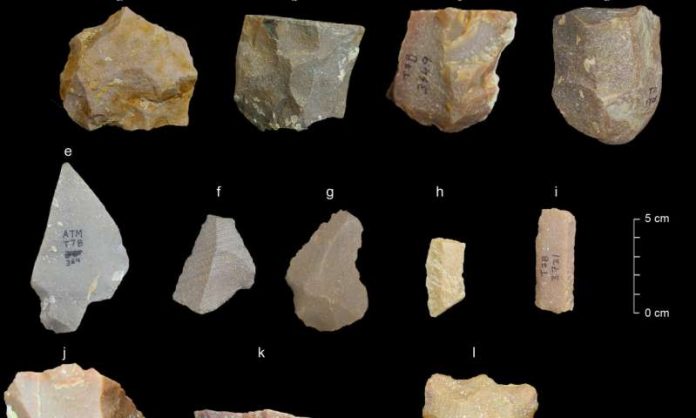The finding suggest that an advanced toolmaking culture was developing in India long before the arrival of modern humans.
Science has long thought that we Homo sapiens didn’t leave Africa until approximately 175,000 years ago. Now a newly discovered collection of sophisticated stone tools in India that dates back to around 385,000 years has archeologists scratching their heads.
It’s a discovery that challenges everything we thought we knew about early humans and changes our understanding of when they spread out to other landmasses.
Using luminescence dating to age the artifacts at the stratified prehistoric site of Attirampakkam, India, the researchers determined that the end of the Acheulian culture and the beginning of the Middle Paleolithic culture began almost 450,000 years ago, much earlier than was conventionally presumed for South Asia. Around 7,261 stone artifacts were extracted from the site, which rests on the banks of a tributary of the Kortallaiyar River.
“Chronologies of Middle Palaeolithic technologies in regions distant from Africa and Europe are crucial for testing theories about the origins and early evolution of these cultures, and for understanding their association with modern humans or archaic hominins,” says the study, published today in the Nature journal.
While the Attirampakaam site and its rich Middle Paleolithic record are best suited for this research, the study also says that insufficient fossil samples have prevented much research in the area. This adds to the significance of their findings.
“At Attirampakkam, the gradual disuse of bifaces, the predominance of small tools, the appearance of distinctive and diverse Levallois flake and point strategies, and the blade component all highlight a notable shift away from the preceding Acheulian [axes],” says the study.
“These findings document a process of substantial behavioral change that occurred in India at [approx. 385,000 years ago] and establish its contemporaneity with similar processes recorded in Africa and Europe. This suggests complex interactions between local developments and ongoing global transformations. Together, these observations call for a re-evaluation of models that restrict the origins of Indian Middle Palaeolithic culture to the incidence of modern human dispersals after approximately 125 [thousand years ago].”
This isn’t even the first groundbreaking research to challenge the long-held “Out of Africa” theory this month—a partial jawbone found in an Israeli cave suggests humans left Africa much earlier than previously thought. “Recent paleoanthropological studies have suggested that modern humans migrated from Africa as early as the beginning of the Late Pleistocene, 120,000 years ago,” that study read. “[We] now suggest that early modern humans were already present outside of Africa more than 55,000 years earlier.”















